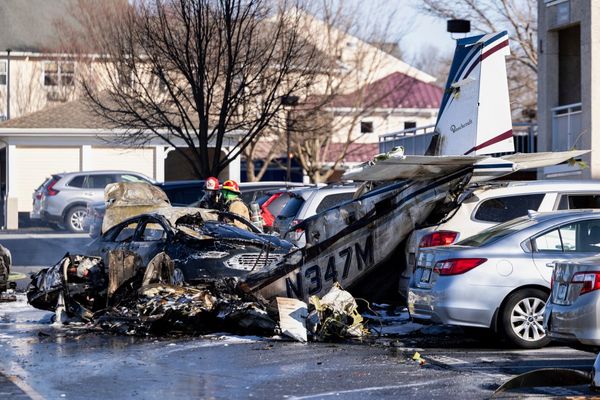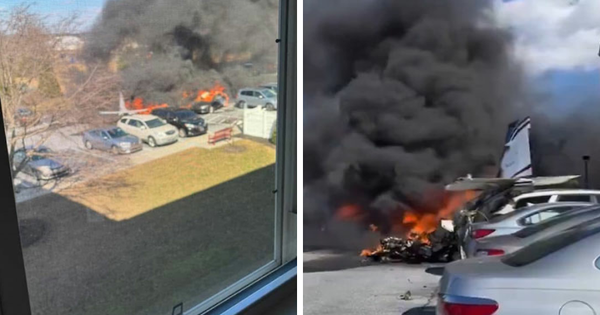New figures have revealed the scale of 'ghost flights' during the pandemic, with 14,472 taking place from UK airports between March 2020 and September 2021.
The term used for deserted planes, which travel either empty or at less than 10 per cent of passenger capacity, ghost flights are often both unprofitable and bad for the environment, with campaigners saying they generate millions of tonnes of unnecessary greenhouse gases every year.
From Manchester Airport, 1,548 such aircraft departed between that time period, equating to nearly 130 a month – the second highest number of 'ghost flights' after Heathrow.
It follows a report from the Manchester Evening News in February last year that flights were continuing to operate from ‘red list’ countries like Dubai and Abu Dhabi – despite Manchester not being among the five designated ‘quarantine ports’ at the time.
It emerged that these flights were in fact arriving passenger-free to pick up those people who had a valid reason for outbound travel, which at the time did not include holidays.
In normal times, airlines must stick to at least 80 per cent of their departure slots from airports in order to retain their schedules.
During the pandemic, as passenger numbers plummeted – at one point Manchester Airport was processing around 5 per cent of its usual traffic – the Government suspended this requirement.
It was only in October, outside the time period of the data set, that the requirement for airlines to fill departure slots was increased to 50 per cent, with a further increase to 70 per cent due at the end of March.
Pete Abel from Manchester Friends of the Earth, said: "To tackle climate change we need to be reducing our emissions, not needlessly increasing them. Flying empty planes to preserve airport take-off slots is an act of environmental vandalism.
"With the second highest number of ghost plane departures during the Covid-19 pandemic, Manchester Airport Group urgently needs to work with the Government to prevent this kind of climate-wrecking activity.
"Greater Manchester aims to be carbon neutral by 2038. To achieve this the aviation industry needs to reduce climate emissions from air travel. With current aviation technology, that can only mean fewer flights and introducing measures such as a frequent flier levy, removal of tax breaks on aviation fuel and a 'polluter pays' approach."
The data was covered by the Guardian after it was produced by aviation minister Robert Courts in response to a parliamentary question from Leeds North West Labour MP Alex Sobel. Both Mr Sobel and the Department for Transport were asked for comment.
A number of airlines which operate from the hub were also contacted, with Virgin Atlantic denying it operated any 'ghost flights'.
A Virgin Atlantic spokesperson said Covid-19 had had an 'unprecedented impact' on customer demand and that between April 21 and mid-July 2020 they operated no passenger flights.
They said lower occupancy flights beyond this period were not 'ghost flights' as they supported the 'global movement of people including returning foreign citizens and repatriated UK citizens', as well as keeping supply chains running by moving cargo, medical supplies and PPE."
On the return of a 70 per cent departure slot requirement, they added: "It's disappointing that the DfT has chosen to set the highest slot use threshold in the world for the summer 2022 season.
"This decision risks setting back the aviation industry and UK economic recovery during a crucial phase and could lead to inefficient flying by some carriers simply to maintain airport slots, with markets in Asia still up to 90 per cent below 2019 demand levels, including Greater China which is largely closed to foreign visitors.”
Despite the suspension of slot regulations, a Manchester Airport spokesperson said: “The operation of so-called 'ghost flights' is outside the control of any airport, and relates to an EU regulation about the percentage of services flown by airlines.
“Decisions about whether flights are completed are made entirely by individual airlines. Manchester Airport is playing a leading role in international efforts to decarbonise the industry in the years ahead.”
The travel industry, and the aviation sector in particular, were among the hardest hit by the pandemic.
Throughout the crisis, lockdowns and travel restrictions, it led to campaigns and appeals for more support and leniency from the Government and led to redundancies at hubs across the country, including Manchester.
A Department for Transport spokesperson said: “We acted swiftly to avoid the risk of near-empty aircraft continuing to fly during the pandemic by fully suspending the rules requiring airlines to use slots in order to retain them in Summer 2021.
“Now, as testing requirements are removed and travel returns, we’re taking a step back towards the normal rules, by continuing alleviation but setting the threshold at 70 per cent for Summer 2022, up from 50pc for Winter 2021.
“This balances the need for continued support for the sector’s finances, while ensuring slots get used where demand allows.”
For more stories from where you live, visit InYourArea







